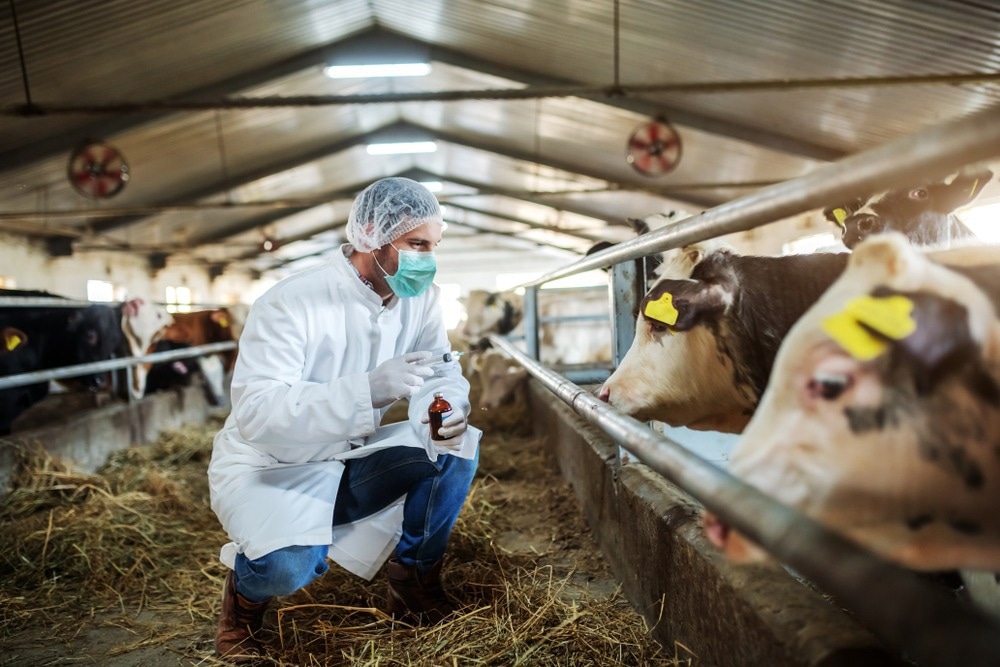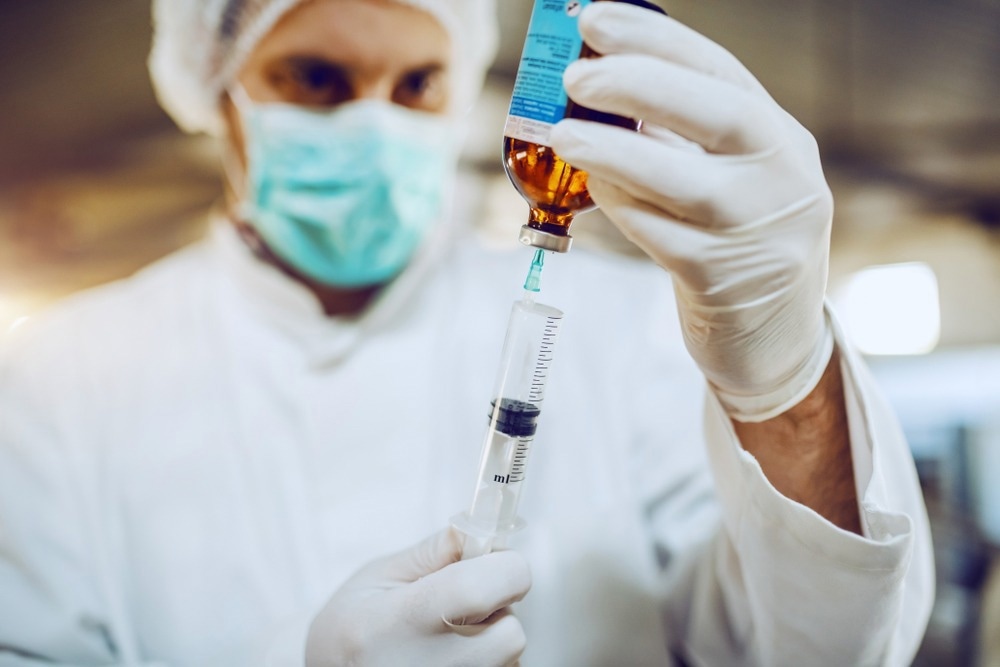Home › Forums › ANTI-VAXXERS › How Veterinary Vaccines Affect Human Health
- This topic is empty.
Viewing 1 post (of 1 total)
-
AuthorPosts
-
2022-12-27 at 19:37 #387279
 Nat QuinnKeymaster
Nat QuinnKeymasterIntroduction
Why veterinary vaccines are important?
Types of veterinary vaccines
How can veterinary vaccines positively impact human health?
How can veterinary vaccines adversely affect human health?
References
Further Reading
The use of veterinary vaccines is increasing exponentially to protect both animal health and public health. However, there is evidence indicating that humans unintentionally exposed to veterinary vaccines can develop adverse events.
 Veterinary vaccines. Image Credit: Dusan Petkovic/Shutterstock.com
Veterinary vaccines. Image Credit: Dusan Petkovic/Shutterstock.comWhy veterinary vaccines are important?
Veterinary vaccines play essential roles in protecting farm animals (livestock), wild animals, and pets from life-threatening diseases. The vaccines also reduce the need for antibiotics and enable the production of sufficient food animals for the ever-growing human population.
The Global Rinderpest Eradication Program, which involved veterinary vaccination, is one of the biggest achievements in veterinary medicine. It helped to completely eradicate rinderpest in 2011. This is the first animal disease to be eradicated globally.
Types of veterinary vaccines
The first-generation veterinary vaccines including inactivated and live-attenuated vaccines have gained considerable success in livestock and poultry industries. However, these classical vaccines come with potential disadvantages. While inactivated vaccines fail to induce broad-spectrum immune responses, live-attenuated vaccines are associated with the risk of disease spread.
The disadvantages of first-generation vaccines have been addressed in the second-generation (recombinant subunit vaccines) and third-generation vaccines (DNA, RNA, viral-vector-based, and chimeric vaccines). Another novel invention is marker vaccines that involve deletion mutants of wild-type pathogens.
How can veterinary vaccines positively impact human health?
Veterinary vaccines play equally viral roles in human well-being. The vaccines used in livestock and poultry help to maintain optimal animal health and improve the production of food animals. Collectively, these efforts lead to an increased supply of high-quality animal protein to the human population.
According to estimations from the United Nations, the global human population is 8 billion currently in 2022. This is expected to reach 9.7 billion in 2050. To meet the food demand of the fast-growing human population, a significant increase in animal food production is necessary. Veterinary vaccines play essential roles in meeting this need.
Besides protecting animals, veterinary vaccines reduce the risk of zoonotic diseases that jump from animals to humans through various routes of transmission. In developed countries, human rabies has almost been eradicated by vaccinating domestic and wild animals with rabies vaccines.
The ongoing coronavirus disease 2019 (COVID-19) pandemic is the most prominent example of increasing human vulnerability to zoonotic diseases.
Altered anthropogenic land use, environmental deterioration, and globalized trade and travel are the leading causes of pathogen spillover from animal to human populations, leading to the emergence of novel and deadly zoonotic diseases. The rapid development of novel veterinary vaccines could play a vital role in controlling the emergence of these diseases.
Veterinary vaccines developed against various pathogens (Escherichia coli and Salmonella enteritidis) help reduce pathogen shedding from infected animals, and thus, reduce the risk of foodborne diseases in humans.
Veterinary vaccines reduce the need for antibiotics that are used to treat infections in animals. Excessive use of antibiotics can lead to the emergence of resistant bacteria in animals. Consumption of raw or undercooked animal food may lead to the transfer of resistant bacteria from animals to humans. Consumption of vegetables, fruits, or water that are contaminated by animal feces can also infect humans with resistant bacteria. The use of vaccines to prevent infection instead of antibiotics reduces the risk of antibiotic resistance.
 Veterinary vaccines. Image Credit: Dusan Petkovic/Shutterstock.com
Veterinary vaccines. Image Credit: Dusan Petkovic/Shutterstock.comHow can veterinary vaccines adversely affect human health?
Related Stories
- Study demonstrates robust antibody response elicited by trivalent protein subunit vaccine against SARS-CoV-2
- MHRA authorizes the COVID-19 vaccine developed by Sanofi
- The impact of multimorbidity, smoking status, and demographics on vaccine hesitancy among pregnant women in Wales
Increased use of veterinary vaccines may increase human exposure to vaccine strains, which in turn can adversely affect human health.
Many veterinary vaccines are administered to animals through oral or nasal (aerosol vaccines) routes. These routes of vaccine administration can put nearby people at higher risk of unintentional exposure to vaccine strains.
Many live-attenuated vaccines are currently available for animal use. The administration of live vaccines to food animals can increase the risk of human exposure to vaccine strains, which subsequently can have a negative impact on human health.
Elderly people, cancer patients, organ transplant recipients, human immunodeficiency virus (HIV)-infected people, and other immunocompromised patients are particularly at risk of developing adverse health effects following exposure to veterinary vaccine strains.
Regarding occupational exposure, veterinarians are at higher risk of exposure to live vaccine strains through needlestick injuries or open wounds, or eye splashing. Occupational exposure to veterinary vaccines can also occur in people involved in animal and fish farming.
Studies investigating occupational exposure to veterinary biologic products have indicated that unintentional autoinoculation of live anthrax vaccine and Brucella and Newcastle virus vaccines induces local and systemic infections in humans.
One of the most common symptoms related to veterinary vaccine exposure is an allergic or inflammatory reaction at the site of injection (inoculation). Adjuvants used in vaccine formulations are responsible for these adversities.
There is evidence indicating that unintentional injection in the joints and fingers may lead to sterile joint abscesses and finger necrosis, respectively. In some cases, auto-injection has been found to cause anaphylactic reactions that require hospitalization.
Besides unintentional exposure, people can intentionally expose themselves to veterinary vaccines. For example, people sometimes use veterinary vaccines as prophylaxis against certain diseases (West Nile encephalitis, Lyme disease, and anthrax) for which no human vaccines are available.
References
-
Roth., JA. (2011). Veterinary Vaccines and Their Importance to Animal Health and Public Health. Procedia in Vaccinology. https://www.sciencedirect.com/science/article/pii/S1877282X11000270
-
Sohag., MMH. (2021). Impact of Veterinary Vaccines on Human Health and Probable Challenges. Acta Veterinaria Eurasia.
-
https://actavet.org/en/impact-of-veterinary-vaccines-on-human-health-and-probable-challenges-16588
-
Strausbaugh., LJ. (2003). Human Illness Associated with Use of Veterinary Vaccines. Clinical Infectious Diseases. https://academic.oup.com/cid/article/37/3/407/437242
-
Meeusen., ENT. (2007). Current Status of Veterinary Vaccines. Clinical Microbiology Reviews. https://www.ncbi.nlm.nih.gov/pmc/articles/PMC1932753/
How Veterinary Vaccines Affect Human Health (news-medical.net)
-
AuthorPosts
Viewing 1 post (of 1 total)
- You must be logged in to reply to this topic.
